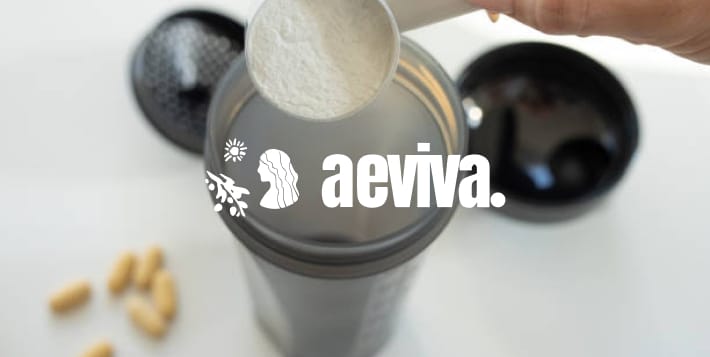- Aeviva
- Posts
- Creatine: Performance Booster or Just a Shortcut for the Lazy?
Creatine: Performance Booster or Just a Shortcut for the Lazy?
Creatine is one of the most popular supplements in the fitness world—but is it really a performance booster or just a shortcut for those who don’t want to put in the work? Let’s uncover the truth.

"A Gym Game-Changer or Just an Easy Way Out?"
Feeling stressed? You’re not alone—over 75% of adults report feeling moderate to high levels of stress daily. That’s where adaptogens come in. These stress-fighting herbs have been gaining massive popularity, showing up in teas, powders, and even skincare. But do they live up to the hype, or are they just another wellness fad? Let’s dive into the science, benefits, and practical ways to incorporate adaptogens into your life.

What Is Creatine and How Does It Work Naturally in Your Body?
Creatine is a compound naturally found in your body, primarily stored in your muscles. About 95% of your body’s creatine is stored as phosphocreatine, while the rest is found in the brain and other tissues. It’s made up of three amino acids: arginine, glycine, and methionine.
Its primary function is to replenish ATP (adenosine triphosphate), your body’s main energy currency. When you perform high-intensity activities like lifting weights or sprinting, ATP is rapidly depleted. Creatine steps in to quickly regenerate ATP, allowing you to keep pushing harder for longer.
💡 Fun Fact: Creatine is found in foods like red meat, fish, and poultry, but most people would need to consume large quantities of these foods to meet the levels achieved through supplementation.
Why Adding Creatine Changes the Game
Supplementing with creatine increases the amount of phosphocreatine in your muscles, providing an energy reserve that your body can tap into during intense exercise. This means:
More Power: You can lift heavier weights or perform explosive movements more effectively.
Improved Endurance in Short Bursts: Activities like sprinting or jumping see significant benefits.
Faster Recovery Between Sets: Creatine helps reduce the time needed to recover between high-intensity efforts.
Muscle Growth: By enhancing performance, creatine indirectly contributes to muscle hypertrophy (growth) when paired with a proper training program.
💡 Key Insight: Research shows that creatine supplementation can increase muscle mass by 2–5% within a few weeks, depending on training intensity and diet.
Real Pros and Cons of Creatine Supplementation
✅The Pros:
Backed by Science: Decades of studies confirm its safety and effectiveness for boosting strength and power.
Accessible and Affordable: Creatine monohydrate is one of the most cost-effective supplements available.
Not Just for the Gym: Studies suggest creatine may improve brain function and protect against age-related muscle loss.
Safe for Most: Extensive research has debunked myths about creatine harming the kidneys or liver in healthy individuals.
❌The Cons:
Water Retention: Creatine can cause your muscles to hold water, leading to a temporary "bloated" look.
Not Instant: Results require consistent use and training; it’s no magic pill.
Digestive Upset: Some people report mild stomach discomfort when starting supplementation.
May Not Work for Everyone: A small percentage of individuals, known as “non-responders,” experience little to no benefits.
💬 Real Review: “I’ve been using creatine for 6 months, and my bench press went up by 20 pounds. But I did notice a bit of bloating when I started.” — Mark, 28, amateur bodybuilder.
Creatine: Shortcut or Tool? The Verdict
Calling creatine a "shortcut" overlooks the reality: it doesn’t replace hard work. Supplementing can enhance your performance, but without proper training and nutrition, its benefits are minimal. Think of it as a tool to unlock your potential, not a cheat code.
🧑⚕️ Dr. Emily Santos, a sports nutritionist, explains: “Creatine allows athletes to push beyond their limits, but it doesn’t do the work for you. It’s a supplement, not a substitute for effort.”

Exclusive topics

The Creatine Buyer’s Guide: Don’t Get Scammed
In today’s market, it’s easy to fall for creatine products loaded with buzzwords like “advanced formula” or “explosive strength.” The truth? Stick to creatine monohydrate—it’s the gold standard backed by decades of research. Look for labels with Creapure® certification for top-tier purity and manufacturing quality.
Be cautious of proprietary blends or added ingredients like caffeine—they inflate prices without proven benefits. For the best results, choose a product that’s 100% transparent about its ingredients. Simple, clean, and effective.
💡 Want more insider tips on picking supplements and optimizing your health? Join our exclusive newsletter for in-depth, expert-curated guides like this one. Stay ahead of the curve—subscribe today! 🚀
Creatine isn’t a magic pill, but it’s far from just a lazy shortcut. It’s one of the most effective, affordable, and well-researched supplements available, offering tangible benefits for strength, performance, and even brain health. Whether you’re an elite athlete or just starting your fitness journey, creatine can be a powerful ally—when paired with hard work and consistency.
Take-Home Message
Creatine replenishes ATP, your body’s energy source, for improved performance.
Benefits include more power, faster recovery, and potential cognitive improvements.
It’s safe and effective, but it doesn’t replace hard work or training.
Side effects are minimal, with water retention being the most common.
Results vary—non-responders may not experience the same benefits.
Creatine is best paired with consistent training and proper nutrition.
Don’t fall for the myth: creatine supports effort but doesn’t replace it.
Reply